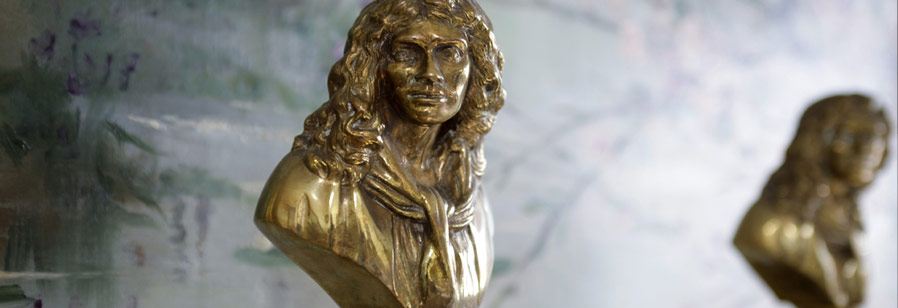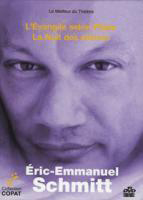Summary
My Gospels (The Night of the Olives and The Gospel according to Pilate)
Two plays about the same mystery, to be acted together or separately. Both are the adaptation for stage of the novel The Gospel according to Pilate, 2004.
'I called these two texts My Gospels to show that I am not propounding any truth, still less the truth, historical or theological; I am simply offering my way of seeing things. When you talk about paintings, music, books or films you automatically rearrange events, highlight this, omit that. In the same way, believers and unbelievers alike all invent a fifth Gospel.'
The Gospel According To Pilate
On the last day of Passover, Pontius Pilate hears that Jesus, the magician from Nazareth, has vanished from his tomb. To prevent the theft being used for political ends, Pilate launches an enquiry and tries to find the corpse. But it reappears… alive!
Rejecting irrational explanations, Pilate trawls Jerusalem in search of a logical answer, interrogating Herod, Herodias, the disciples, doctors, and the High Priest of the Temple, but when he finds his efforts thwarted, he sets out along the roads of Galilee. Yet the further he goes, the more the mystery deepens.
Reviews
Télérama - « The Schmitt hallmark »
The Schmitt hallmark
(...) Eric-Emmanuel Schmitt's new work for the stage deals with Pilate at the point when the body of Christ has just disappeared from the tomb. How did the Roman procurator responsible for keeping the peace follow up this dangerous case? (...)
Schmitt portrays a character on a stirring interior journey in a drama that shows the playwright's consummate skill at choosing words to move and situations to touch his audience. And who can blame him, for, as so often in his theatre, his aim is to defend tolerance, generosity and awareness of other people. This is a very 'written' play with a strong argument, and Jacques Weber's performance amply highlights its clarity and Pilate's inner torment and captures the sonorous yet intimate tone. A play in the grand French theatrical tradition.
Fabienne Pascaud
Pariscope - « Virtuoso Weber »
Virtuoso Weber (...) The strength of this show lies in the magic of the meeting of play, director and actors. Christophe Lidon brings all his sensitivity to Schmitt's world. This is the second time Schmitt has asked him to direct (the first was for Oscar and the Lady in Pink): a thoroughly laudable choice. As always, Lidon's production is aesthetic, beautiful even.
Claude Lemaire's superb set design, Renato Bianchi's costumes and Marie-Hélène Pinon's lighting complete his vision. But there's no drama without actors: Erwan Daouphars plays the scribe with gravity and inventiveness. And what stage presence from Jacques Weber, clearly enjoying himself hugely as Pilate, in a truly staggering performance offered to his audience like a gift. Not for years has he brought such depth and sparkle to a rôle.
Marie-Céline Nivière
Le Parisien - « Superlative acting from Jacques Weber »
Superlative acting from Jacques Weber "Eric-Emmanuel Schmitt's reworking of a story we thought we knew focuses on tiny details and lesser-known facts. This is a work of scholarship presented with an indisputable sense of drama. Jacques Weber, alone on stage, accompanied at times by his scribe Sextus (Erwan Daouphars), gives us a superb Pilate, a man of reason whose certainties are shaken by the mystery confronting him.
André Lafargue
Le Point - « A dialogue between Pontius Pilate, prefect of Rome in Judea, ... »
An apostle named PilateImagine a dialogue between Pontius Pilate, prefect of Rome in Judea, and his scribe Sextus. News comes that the body of Jesus of Nazareth has disappeared from its tomb. The procurator investigates. What are his innermost thoughts? Who is the man behind the official persona? The character is far from spoiled by being portrayed in Schmitt's drama as someone with a philosophical and religious bent. Like Jesus, he is in his garden. If this were Marguerite Yourcenar, there would be a fierce and sceptical battle; Schmitt prefers incense, enigma and darkness. And fervour. And zeal. Pilate is deftly characterised with the keen intuition of Hercule Poirot. (...)
Jacques Weber deploys his full range of acting powers to perform Schmitt's 'fifth Gospel'. Frédéric Ferney
Frédéric Ferney
Le Pélerin - « The day after Christ's resurrection, Pilate, ... »
The day after Christ's resurrection, Pilate, confronted by the mystery of the body's disappearance, begins investigations and sends his brother an account of them, dictating his letters to his faithful scribe Sextus. Tremendous! (...)
Interiority is all in this play, and Schmitt is amply served by Jacques Weber's imaginative genius. The effect is a stirring show that makes a story we have heard a hundred times appear genuinely and radically new. The message Schmitt has taken from the Gospels is that every tale is worth retelling for contemporary audiences and the prevailing culture. Today's men and women, who have been reared on scepticism, will have no difficulty identifying with Pilate as he goes from one rational hypothesis to another in his attempt to solve the enigma of 'the empty tomb' (...).
René Poujol
France-Soir - « Detective workEric-Emmanuel Schmitt imagines ... »
Detective workEric-Emmanuel Schmitt imagines a fifth Gospel dictated by Pilate at the point of Christ's resurrection. Unable to understand this event, the Roman procurator begins investigations like a true detective in search of tangible facts (...).
His act is convincing and compelling. Schmitt is a believer and the subject is close to his heart; that this is obvious only benefits the play. Jacques Weber is his dependable self and plays Pilate in a masterly performance of unaccustomed gravity with no unnecessary voice effects and just the odd moment of muted, well-modulated humour that is not overdone. His acting has never seemed so right. Erwan Daouphars makes an excellent scribe. Staging, costumes and music are fittingly simple. This is a fine work that should be well received for different reasons irrespective of whether the spectators are believers or not.
Arianne Dolfus
Le Canard enchaîné - « The good news »
The good news
According to Eric-Emmanuel Schmitt, Pilate, Pontieus by his first name, Tiberius' prefect in Judaea, the man who for 2000 years has been washing his hands of the crucifixion, kept up a correspondence with his brother. (...). This Pilate is a rationalist. (...) It is Easter. When the curtain rises, he has the situation in hand (...). But the clerk Sextus (Erwan Daouphars) interrupts the peace with unwelcome news: the corpse of the Nazareth 'magician', the troublemaker everyone called Yeshoua, has escaped. Pilate now turns into Sherlock Holmes in search of clues, following trails like a dog after truffles, prepared to listen to everyone. But he is not easily hoodwinked.
This strange adventure would not be complete without the calm, familiar presence of the actor and the natuaral way he clutches at straws as though it were the obvious thing to do. A genuine miracle. Eric-Emmanuel Schmitt, the reporter, is hot on the heels of the prefect. (...) Jacques Weber in Christophe Lidon's production adopts a glittering humility in his quarrel with the unreason beleaguering him. (...) Pilate is troubled, and it would not take much for him to doubt himself. (...) Which possibly makes him, in spite of everything, the first Christian, a hero malgré lui in a story that will continue to inspire considerable verbiage for a long time to come. On this point, Schmitt is unlikely to be wrong. This is where the skill and ambiguity of the play lie. Touché!
Bernard Thomas
Les Echos - « The Gospel according to Pilate »
Schmitt the enigmatic
(...) So much success: the man is an enigma. He stirs audiences with ideas, lessons in religion and clear, vital spiritual messages where the didactic motivation is obvious, and yet he still manages to enthuse people.
How does he do it?
Answer: the way he does it here, with beautiful, limpid language, a sense of drama, elements of surprise and the luck to have great actors in his wake (...). Directed by Christophe Lidon with Jacques Weber looking imperial in a grey toga as Pilate (...), this extended monologue about the irrational disappearance of the tortured body of Yoshoua may be a bit long (an hour and a half) but is so beautifully developed and delivered that the audience seemed transported... to seventh heaven. The Théâtre Montparnasse surely has a new success on its hands.
Annie Coppermann
La Vie - « Yechoua's body has disappeared. »
Yechoua's body has disappeared. Three days after his crucifixion, his tomb is found empty. Pontius Pilate, the rationalist prefect in Judea, is hot on the case. Doggedly determined to put an end to the rumours of resurrection, he leaves no stone unturned in a breathless chase to discover the truth. Until the moment when enigma gives way to mystery.
Skilfully written as a detective investigation, the play invites us to engage with the themes of doubt and belief. Jacques Weber plays a bewildered Pilate with flair.
Christine Monin
Le Progrès - « Ever the philosopher, ... »
(...) Ever the philosopher, enough, at least, to refuse to be press-ganged into conventional religion, Schmitt has chosen a kind of gospel that is a total success, treating his audience to the pleasure of thought-provoking theatre.
J.Ph. Mestre
Le Figaro - « Christophe Lidon's production ... »
Christophe Lidon's production is simple and pure, mirrored by the set design, costumes (Renato Bianchi), lighting (Marie-Hélène Pinon) and a few musical effects at well-timed moments (Didier Goret).
A very polished performance of integrity and sobriety.
Armelle Héliot
Publications
- In french language, published by Albin Michel
- In Lithuanian language, published by Alma Littera
- In Polish language, published by Znak, 2006
- In Persian language
- In Latvian published translation by Janis Rose
Stage Productions
- Belgium
Brussels, Théâtre du Parc, 2005 - France
Théâtre Montparnasse, 2005 - Germany
Bonn- Bad Godesberg, Kleines Theater im park, 2009/2010 - Italy
National Tour, 2008-2009 - Switzerland
La Chaux-de-Fonds, Théâtre l'heure bleue, 2005
Zürich, Z¨rich Theater 58, 2009/2010





